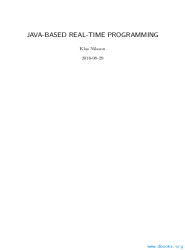Java-Based Real-Time Programming
Java (and partly C#) is such a language. Still, programming in C is appropriate for device drivers, which do need to directly access the hardware. For similar reasons of scalability, Microsoft had to go from their Win32+MFC C/C++-oriented standard to the Microsoft.NET Framework with C# in order to stay competitive in the long run. Here, we will go some steps further, considering also small embedded systems and severe timing demands.
We will approach the real-time issues via established web-programming and concurrency techniques, which will reveal a few deficiencies of the standard Java platform. A real-time package (class library) and a few run-time extensions will be presented. The usage of these additions to create high performance real-time control software is then described in a real-time programming chapter which is central the topic of this book. The reader should then gain additional understanding and programming skill by studying the remaining chapters about scheduling, processes, and applications.
Table of contents
- Software execution is performed sequentially
- Our physical world is parallel
- Parallel computing
- Concurrency
- Interrupts, pre-emption, and reentrance
- Models of concurrent execution
- Multi-process programming
- Object interaction and encapsulation
- Software issues
- Threads
- Resources and mutual exclusion - Semaphores
- Objects providing mutual exclusion - Monitors
- Message-based communication - Mailboxes
| Pages : | 128 |
| Size : | 1.9 MB |
| File type : | |
| Downloads: | 145 |
| Created: | 2022-02-03 |
| License: | GNU FDL |
| Author(s): | Klas Nilsson |

Warning: Trying to access array offset on false in /home/tutovnfz/public_html/article.php on line 233
Others programming Tutorials
Certified Programming with Dependent Types
Introduction to C and GUI Programming
Professor Frisby's Mostly Adequate Guide to Functional Programming
Others related eBooks about Java-Based Real-Time Programming
Learning Python MatplotlibDownload free course Learning Python Matplotlib, pdf file on 97 pages by Stack Overflow Community....
Fundamentals of Python ProgrammingThis book does not attempt to cover all the facets of the Python programming language. Exp..., download free Python tutorial in PDF (669 pages) created by ....
Algorithmic Problem Solving with PythonThis book uses Python to introduce folks to programming and algorithmic thinking. It is sharply focused on classical algorithms, but it also gives a solid understanding of fundamental algorithmic problem-solving techniques. ...
Reverse Engineering for BeginnersDownload free ebook about Reverse Engineering for Beginners. A PDF tutorial on 942 pages by Dennis Yurichev....
DevOps for Digital LeadersLearn to design, implement, measure, and improve DevOps programs that are tailored to your..., download free DevOps tutorial in PDF (173 pages) created by Kieran Taylor ....
Java Web Scraping HandbookDownload free course Java Web Scraping Handbook, pdf file on 115 pages by Kevin Sahin....
How to Build a SharePoint WebsiteDownload free SharePoint tutorial in pdf, training document on 11 pages for beginners....
Learning AndroidA complet Android Course in PDF format, this is a free Android ebook created for educational purposes by Stack Overflow documentation....
TypeScript Notes for ProfessionalsDownload free course TypeScript Notes for Professionals, pdf file on 96 pages by Stack Overflow Community....
Learn Pascal Programming TutorialA complete course on object programming in Pascal. In the first part, you learn how to use existing code written in object programming. Or, in other words, to use existing classes, especially those used to make the GUI of an application....